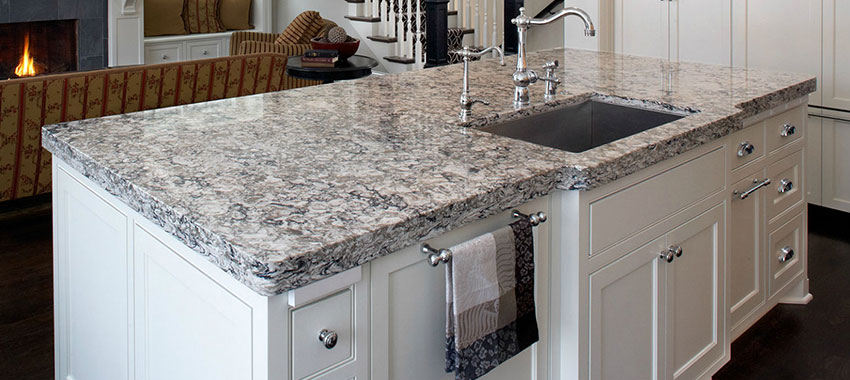Kitchen countertops are an essential aspect of your new kitchen design, and choosing between quartz and granite is an important decision. Though we have written about this before, some topics deserve a second look!
A countertop in your kitchen or bathroom is a statement piece that can either enhance a room’s appeal or detract from its value. On the higher end of countertops, two choices remain popular into the current day: quartz and granite. We often discuss these materials, as their striking appearance can completely revolutionize your design goals. Before you make a decision, read this blog to find out the differences between these two types of counters. When shelling out for a high-quality product, research is key!
Basics
The main difference between granite and quartz is their material components and acquisition method.
Granite countertops are a complete slab, mined from a quarry in large chunks and further reduced in size to fit your needs. Granite is a 100% naturally formed product, allowing you to brag about your wholly original and unique countertop.
Quartz countertops, on the other hand, are manufactured. Using quartz and a range of mineral products, a solid and durable countertop can be made with specific properties, shapes, patterns, and colors. This fact, however, does not mean quartz countertops are not full of natural stones and rocks.
Cost
Both quartz and granite countertops are premium products, ranging in price from $80 to $200 per square foot when installed. When selecting for cost, your choice will vary depending on your design goals and needs. A rare granite pattern might cost more than an economical quartz countertop, but a less sought-after granite slab can be much cheaper than a well-produced slab of quartz.
Appearance
Each individual room design will affect whether or not granite or quartz is a better option for your countertop. In general, a quartz slab will allow you to plan your design down to the minutiae. This is because manufactured quartz slabs are often sold with certain specifications, ensuring the sample you see will look identical to the one delivered to your home. Granite, however, can be an entirely different beast. If you are considering renovating a room in your house, browsing through granite countertop options can be a great way to begin the process. You can begin building an entirely unique design by finding a unique countertop with varying amounts of minerals such as quartz and mica.
Maintenance
Granite is a porous material, meaning water and other fluids can seep down into the surface and harbor nasty bacteria and germs. When installing your granite countertop, a sealant must be applied to protect against these spills and stains. This process should be repeated as often as necessary, often within 2 or 3 years of the previous application. Quartz, however, is manufactured; therefore, any porous material is sealed through manufacturing processes before the sale. Quartz is often seen as more durable, only needing cleaning and treatment after major spills and messes.
Both countertops can be cleaned with any material-safe cleaning agent and water. If properly sealed, no particular actions need to be taken outside of regular cleanings to keep both countertops looking great for years. Granite countertops are often touted as being heat resistant when compared to quartz. Placing a hot pan or dish onto your granite countertop is no issue. On the other hand, quartz might warp or burn slightly from direct contact with a hot object. To combat this, any number of simple solutions can be employed, such as a coaster or heat-resistant padding.
Both granite and quartz countertops are perfect for a stylish new bathroom or kitchen design. Our design experts at West Coast Design Build Florida are here to help you make the right choice, from countertops to kitchen cabinets.


Recent Comments